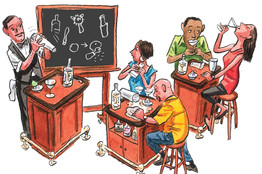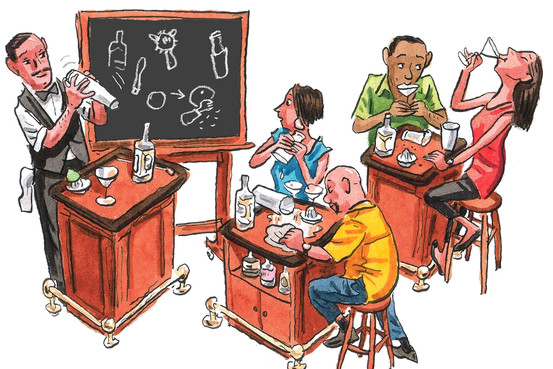By ELIZABETH GARONE
At a dinner at a friend's house, there was a bevy of cocktails to choose from: a whiskey sour, pomegranate martini and a lemon drop among them. When that friend came to our house, the choices were: beer, wine and a margarita from a mix.
We decided it was time to expand our drink-making repertoire with some cocktail-making classes, which are designed to take students to bartender status in just two hours.
The Boothby Center for the Beverage Arts is a San Francisco nonprofit that offers cocktail-making classes, both at the center's downtown demonstration bar and at private parties.
What was dubbed as a two-hour primer turned out to be more than three hours of fascinating San Francisco drinking history and hands-on cocktail making from scratch with no mixes in sight. In addition to running the center, the instructor, H. Joseph Ehrmann, owns Elixir, one of San Francisco's oldest bars.
The center is set up with rows of practice bars and stools facing a demonstration bar stocked with spirits. Each station had a full set of drink tools, including a strainer; a Boston Shaker (a glass and metal shaker that allows for both shaking and stirring drinks); a citrus squeezer; a muddler and a zester.
For the first hour, we listened to Mr. Ehrmann talk of how San Francisco had long been a cocktail town as far back as its Gold Rush days. Then he demonstrated how to make each drink—right down to how and when to pour the ice. The 25 students then made their own. Our first drink was a classic martini. Manhattans, margaritas and mojitos followed.
We were encouraged to sample our creations as we made them, and many students (all 21 and older) chose to polish off all of their drinks. Within a short time, the atmosphere became much more relaxed. Our only complaint was that by the time we left, we had imbibed enough alcohol to forget most of what we learned. A handout would have been nice.
Mr. Ehrmann said he has since added a reference document, which he can email to students after the class. The document includes recipes for the four drinks we made in the class as well as explanations as to "why we do the things we do in those drinks." Mr. Ehrmann says he is working on another handout that outlines how to stock a home bar.
For those students who have had too much to drink, Mr. Ehrmann says the instructors will call them a cab or tell them where they can get some food nearby while they "ride it out."
In Manhattan, the Astor Center is the educational counterpart to Astor Wines & Spirits, a liquor store in the East Village. The center offers a number of cocktail-making classes and we picked the two-hour introductory class, "DIY Home Bar: A Hands-On Cocktail Workshop."
There were about 30 students taking the class, which was run by April Wachtel, who has been tending bar for the past decade and now works at Soho's Lani Kai and Brooklyn's Lot 2.
As we walked in, we were handed an Old Fashioned to sample. It was Ms. Wachtel's first creation of the night. The class began with a humorous bartender video, a slide show and a brief overview of cocktail history. Ms. Wachtel did a little demonstrating, which included her shaking technique—an energetic two-shakes up and two-shakes down motion. Then we were given the chance to make five cocktails: a margarita, sidecar, Manhattan, Negroni and two kinds of daiquiris. We spent about 20 minutes on each, which included a short demonstration by Ms. Wachtel.
Again, the more drinks the students made—and consumed—the more boisterous the atmosphere became. So we appreciated that we got a "Ten Cocktails Everyone Should Know" handout that included instructions for making the drinks from the class as well as five others.
In Chicago, we chose "Mixology 101," a two-hour class put on by Pour Souls, which offers mixology workshops, either in-home or at a bar, and cocktail catering. Our instructor, Tim Williams, runs the company and used to be the head mixologist at Chicago's Province restaurant.
Because of cancellations, there were only three students so we were able to ask lots of questions. (The first class we tried to take was canceled after other students backed out.) The class was held at a bar in Chicago's Old Town neighborhood. Mr. Williams didn't make any drinks but walked us through three cocktails, pausing to tell us how to make simple syrup, seal our shakers and avoid bruising our herbs.
The first was a combination of simple syrup, a citrus juice and spirit, which he said is the basis for a number of classic cocktails. Mr. Williams said tequila and lime make a margarita; rum with lime and mint is a mojito, and gin or vodka with lime makes a Tom Collins. The second drink included blackberries and mint, which we combined with vodka. The third cocktail was to be our own creation where we choose ingredients after the three base ingredients. Our combination of strawberries and basil ended up tasting more like an appetizer than a cocktail.
Then we thought we'd try out a DVD to use at home—the promising-sounding "Cocktail 101! Become a perfect bartender—at home!" we found on Amazon.com. We liked the idea of being able to pause and replay details. What we didn't like was the dubbed English-over-German voice-over and the cheap jazzy elevator tunes in the background. Plus, the bartender went really fast, so it was hard to follow him.
—Lori Barrett in Chicago and Nancy Matsumoto in New York contributed to this article.Stir, Shake, Cheers
Here's how three bartending classes and one drink-making DVD compare with each other:
A version of this article appeared June 28, 2012, on page D3 in the U.S. edition of The Wall Street Journal, with the headline: We'll Drink to That: Mastering Cocktail Making.







![[image]](https://iza-server.uibk.ac.at/pywb/dilimag/20210113092156im_/http://si.wsj.net/public/resources/images/OB-TL548_0621sc_A_20120620173018.jpg)
![[image]](https://iza-server.uibk.ac.at/pywb/dilimag/20210113092156im_/http://si.wsj.net/public/resources/images/WO-AK240_EUSUMM_A_20120627172932.jpg)
![[image]](https://iza-server.uibk.ac.at/pywb/dilimag/20210113092156im_/http://si.wsj.net/public/resources/images/P1-BG809_RIM_1_A_20120627164746.jpg)
![[image]](https://iza-server.uibk.ac.at/pywb/dilimag/20210113092156im_/http://si.wsj.net/public/resources/images/NA-BR339_CHARTE_C_20120627163915.jpg)
![[image]](https://iza-server.uibk.ac.at/pywb/dilimag/20210113092156im_/http://si.wsj.net/public/resources/images/MI-BP769A_MADOF_C_20120627172419.jpg)
![[image]](https://iza-server.uibk.ac.at/pywb/dilimag/20210113092156im_/http://si.wsj.net/public/resources/images/PJ-BI178_CRANKY_C_20120627180844.jpg)
![[OB-TK448_0618sc_C_20120618103236.jpg]](https://iza-server.uibk.ac.at/pywb/dilimag/20210113092156im_/http://si.wsj.net/public/resources/images/OB-TK448_0618sc_C_20120618103236.jpg)








Most Recommended
“If there is nothing to hide, the...;”
“Mr Harrop: With due respect, I...;”
“Ms Noonan...Apparently you have...;”
“"The Attorney General is...;”
“The left's demonization of...;”